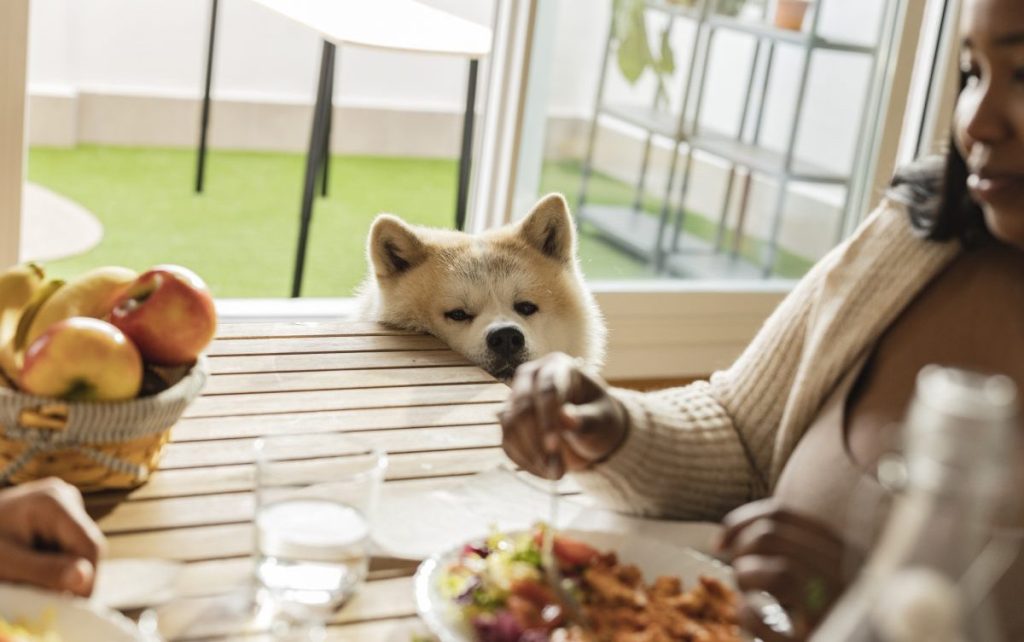Thanksgiving is a time for family, friends, and of course, food. And who loves all three of those things more than dogs? That said, while we’re enjoying our turkey, stuffing, and pie, it’s important to remember that some of our favorite Thanksgiving dishes can be harmful to our dogs.
What may be a feast for everyone else, could turn into a health emergency for the four-legged members of our family very quickly. So, if you want everyone to take that afternoon nap peacefully — including your dogs — here are some Thanksgiving foods dogs should avoid.
Thanksgiving foods that are harmful to dogs
While there can be other foods to avoid based on your dog’s dietary restrictions, here are a few dangerous Thanksgiving eats to avoid under any circumstance.
Turkey bones and skin
Turkey bones can splinter and cause choking or intestinal blockages. This is a serious medical emergency that can require surgery. Turkey skin is high in fat, which can cause pancreatitis in dogs. Pancreatitis is a painful inflammation of the pancreas that can be life-threatening.
What’s more, turkey skin is often seasoned with herbs and spices that can be toxic to dogs. For example, onions, garlic, and nutmeg are all things your dog should avoid.
In addition, turkey bones and skin can be difficult for dogs to digest, which can lead to vomiting and diarrhea. If you are preparing a Thanksgiving meal for your family, be sure to dispose of all turkey bones and skin properly. Do not give them to your dog as scraps.
Gravy
We all love gravy, but is typically high in sodium, which can be dangerous for dogs. Dogs have a different tolerance for sodium than humans, and excessive sodium can lead to dehydration, vomiting, and diarrhea. In severe cases, it can even lead to seizures, coma, and death.
Many gravies contain onions, garlic, or other members of the allium family, which are toxic to dogs. These vegetables can damage red blood cells, leading to anemia. Symptoms of anemia in dogs include lethargy, pale gums, and shortness of breath.
Gravy is often high in fat, which can be unhealthy for dogs. Even healthy dogs should only consume small amounts of gravy, as too much fat can lead to weight gain, pancreatitis, and other health problems.
Although delicious, gravy can be sticky and difficult for dogs to digest, which can increase the risk of choking. If a dog swallows a large amount of gravy, it can harden in their stomach and block their airway.
Onions and garlic
Onions and garlic are part of the allium family. The toxic compound in onions and garlic is called N-propyl disulfide, which damages red blood cells and can lead to anemia. In severe cases, onion and garlic poisoning can be fatal.
Here are some reasons why onions and garlic are toxic to dogs:
- N-propyl disulfide: This compound damages the red blood cells in a dog’s body.
- Thiosulfate: This compound interferes with the oxygen-carrying capacity of red blood cells.
- Thiocyanates: These compounds can damage the liver and kidneys.
At the time of this writing, there is no antidote for onion and garlic poisoning. Depending on the severity, treatment may include: vomiting medication, intravenous fluids, oxygen therapy, and blood transfusions. It may also include activated charcoal.
Raisins and grapes
Raisins and grapes are toxic to dogs and can cause kidney failure. The exact cause of grape and raisin toxicity in dogs is unknown, but it is believed to be due to a compound called tartaric acid. Tartaric acid is found in grapes and raisins, and it is thought to damage the kidneys.
Desserts
Many desserts are high in sugar, which can be harmful to dogs’ health. Dogs are not as efficient as humans at processing sugar, and excess sugar can lead to health problems such as obesity, diabetes, and dental problems.
Some dogs are allergic to ingredients commonly found in desserts, such as chocolate, nuts, wheat, and dairy. These allergies can cause skin problems, digestive issues, and even life-threatening reactions.
Desserts can also contain ingredients that are toxic to dogs, such as chocolate, alcohol, and xylitol. Chocolate contains theobromine, which can cause vomiting, diarrhea, tremors, seizures, and even death. Alcohol can cause intoxication, vomiting, and even death. Xylitol is a sugar substitute that can cause liver failure in dogs.
Alcohol
Dogs metabolize alcohol differently than humans. Their livers are not as efficient at breaking down alcohol, which can lead to elevated blood alcohol levels.
Alcohol contains a substance called theobromine, which is toxic to dogs. Theobromine is found in chocolate, coffee, and tea, and it can cause vomiting, diarrhea, tremors, seizures, and even death in dogs.
The consumption of alcohol can damage a dog’s kidneys and liver, depress their central nervous and respiratory systems, can cause dehydration.
- Never leave open alcoholic beverages around your dog.
- Keep alcohol out of reach of your dog, including in cabinets, drawers, and refrigerators.
- Teach your dog not to beg for food or drinks.
- Supervise your dog closely when they are around people who are drinking alcohol.
Keeping your dog safe on Thanksgiving
- Keep all food out of reach of your dog. This includes the kitchen counters, the dining room table, and the trash cans.
- Don’t give your dog any table scraps. Even a small amount of human food can make your dog sick.
- If you think your dog has eaten something they shouldn’t, call your veterinarian immediately.









